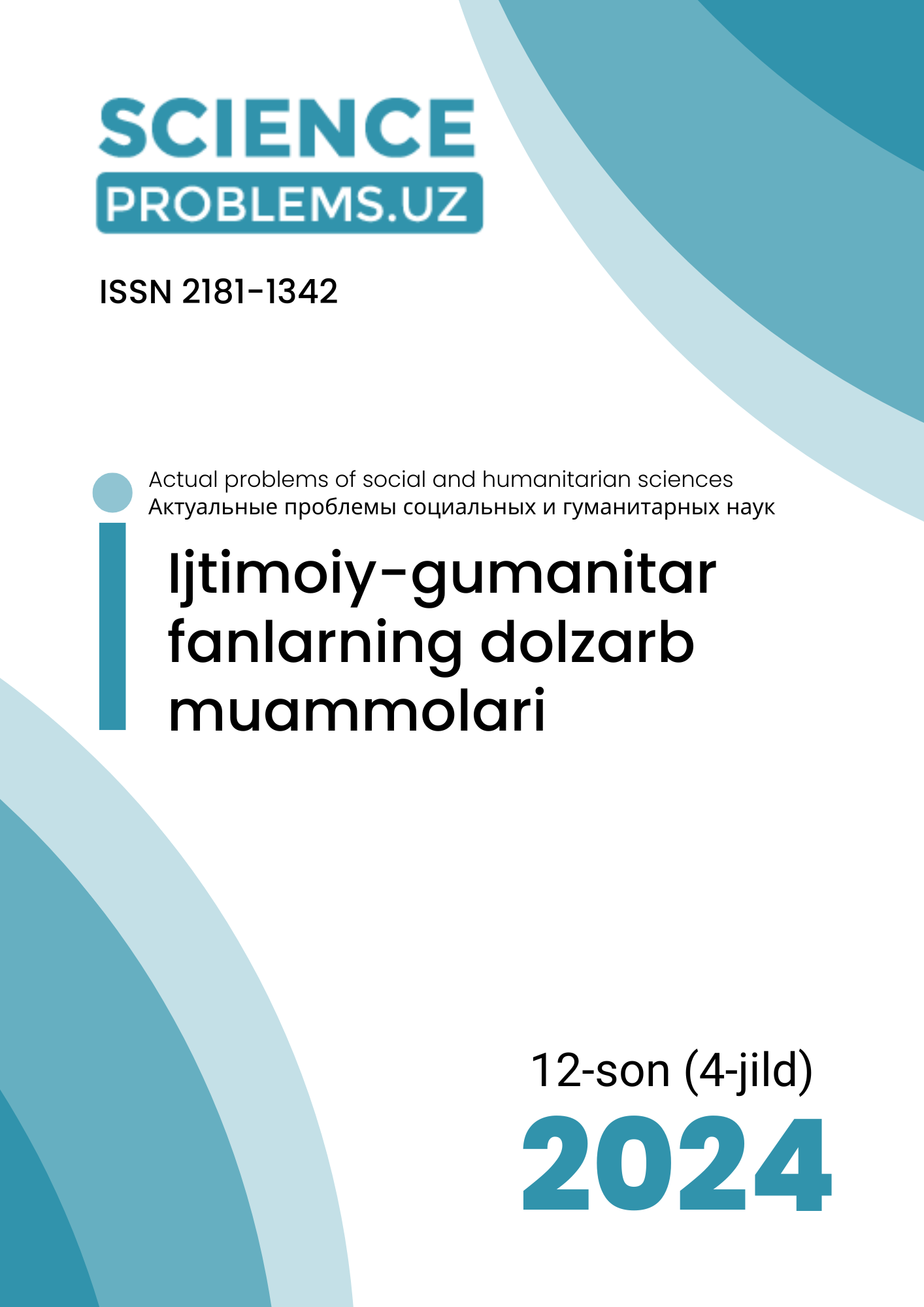KORPUS TILSHUNOSLIGINING YOʻNALISHINI TADQIQOTDAN SINF AMALIYOTIGA OʻTKAZISH
Kalit so'zlar
https://doi.org/10.47390/SPR1342V4I12Y2024N78Kalit so'zlar
korpus lingvistikasi, kelishuv, til taʼlimi, oʻtkazuvchanlik, haqiqiylik, oʻquvchining avtonomiyasi, tilni bilish.Annotasiya
Ushbu maqola korpus lingvistik uslublarini, ayniqsa, muvofiqlashtirishni sinf sharoitida qo‘llashdagi
qiyinchiliklarni o‘rganadi. Garchi lingvistik tadqiqotlarda korpuslarni qo‘llash katta istiqbollarni ko‘rsatgan bo‘lsada,
ularni til ta'limiga kiritish hali ham juda cheklangan. Ushbu maqola korpusni bevosita ta'lim kontekstlarida
qo‘llash bo‘yicha baholash tadqiqotlarini tanqidiy tekshirishni ta'minlaydi va korpus ma'lumotlari, tahlil dasturlari
va tadqiqot muhitidan o‘qitish stsenariylariga o‘tkazilishi mumkin bo‘lgan foydalanuvchi ishtiroki kabi muhim
elementni qanchalik yaxshi baholaydi. Tadqiqotlar til oʻqitishda korpusga asoslangan usullardan foydalanishga
toʻsqinlik qilayotgan asosiy toʻsiqlarni taʼkidlab, ularni umumiy taʼlimda kengroq tatbiq etishni ragʻbatlantirish
yondashuvlarini taklif qiladi.
Manbalar
1. Allan, R. (2006). Using corpora in language learning: A study of concordancing tools.
Language Teaching Research, 10(3), 289-312.
2. Aston, G. (1995). Corpora in language teaching: An introduction. In G. Aston (Ed.), Corpora
and Language Learners (pp. 3-12). John Benjamins.
3. Aston, G. (1997). Enriching the learner’s environment: Corpora in ELT. In A. Wichmann, S.
Fligelstone, T. McEnery, & G. Knowles (Eds.), Teaching and Language Corpora (pp. 51-64).
Longman.
4. Bernardini, S. (2000). Exploring learner’s corpora: A case study of parallel concordancing.
Language Learning & Technology, 4(2), 61-78.
5. Boulton, A. (2007). The effect of corpus tools on language learning: A study of vocabulary
and grammar acquisition. ReCALL, 19(3), 293-310.
6. Braun, S. (2005). Corpus-based language learning and teaching: A comprehensive review.
Language Learning & Technology, 9(2), 35-47.
7. Chan, T., & Liou, J. (2005). Using corpus tools in EFL classrooms: Insights from case studies.
English Language Teaching Journal, 59(3), 184-192.
8. Cook, G. (1998). The uses of corpora in language teaching: A critical review. International
Journal of Corpus Linguistics, 3(1), 45-67.
9. Farr, F. (2008). Corpus-informed language education: A survey of attitudes and practices.
Journal of English for Academic Purposes, 7(3), 217-232.
10. Giyosiddinovna, Radjabova G. "The Implementation of Spoken Corpora in Creating
Teaching Materials." International Journal on Integrated Education, vol. 4, no. 5, 2021, pp.
349-354.
11. Götz, S., & Mukherjee, J. (2006). Corpus-based language learning: A study of concordancing
tools and their use in EFL classrooms. Journal of Language Learning, 14(2), 145-160.
12. Johns, T. (1991). Should you be persuaded: Two samples of data-driven learning materials.
ELR Journal, 4, 1-16.
13. Kaltenböck, G., & Mehlmauer-Larcher, B. (2005). Using corpora in language teaching: A
critical review of methods and results. Language Learning Journal, 32(2), 49-66.
14. Kennedy, G., & Miceli, T. (2001). Learner use of concordance tools in a language classroom.
Studies in Second Language Acquisition, 23(1), 71-99.
15. McEnery, T., & Wilson, A. (1997). Corpus Linguistics. Edinburgh University Press.
16. Mukherjee, J. (2004). Corpus linguistics and language pedagogy: The state of the art.
Language Teaching, 37(3), 221-237.
17. Radjabova Gulnoza Giyosiddinovna. (2022). Corpus-based approach in teaching foreign
languages. Conferencea, 100–103. Retrieved from
https://www.conferencea.org/index.php/conferences/article/view/1236
18. Radjabova G.G. Corpus technologies in teaching academic writing.//O‘zbekistonda xorijiy
tillar. — 2023. — № 1 (48). — B. 92-103. https://doi.org/10.36078/1679549918
19. Stevens, V. (1991). Concordancing software for classroom language learning. System,
19(3), 287-300.
20. Tribble, C. (1990). Concordancing in the language classroom: A tool for teaching and
learning. English Language Teaching Journal, 44(1), 8-16.
21. Tribble, C. (2000). Corpus linguistics: Applications for the classroom. ReCALL, 12(1), 48-56








